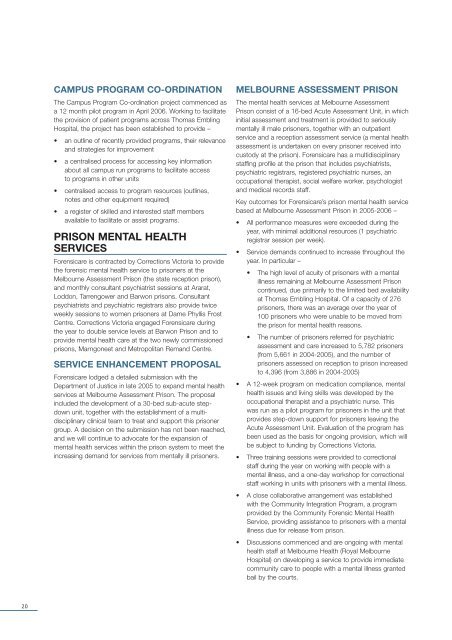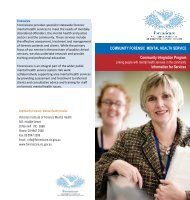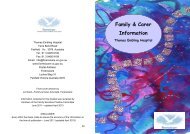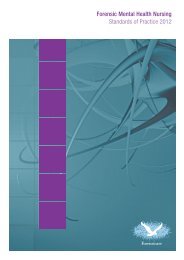Annual Report 2005-2006 - Forensicare
Annual Report 2005-2006 - Forensicare
Annual Report 2005-2006 - Forensicare
You also want an ePaper? Increase the reach of your titles
YUMPU automatically turns print PDFs into web optimized ePapers that Google loves.
CAMPUS PROGRAM CO-ORDINATION<br />
The Campus Program Co-ordination project commenced as<br />
a 12 month pilot program in April <strong>2006</strong>. Working to facilitate<br />
the provision of patient programs across Thomas Embling<br />
Hospital, the project has been established to provide –<br />
• an outline of recently provided programs, their relevance<br />
and strategies for improvement<br />
• a centralised process for accessing key information<br />
about all campus run programs to facilitate access<br />
to programs in other units<br />
• centralised access to program resources (outlines,<br />
notes and other equipment required)<br />
• a register of skilled and interested staff members<br />
available to facilitate or assist programs.<br />
PRISON MENTAL HEALTH<br />
SERVICES<br />
<strong>Forensicare</strong> is contracted by Corrections Victoria to provide<br />
the forensic mental health service to prisoners at the<br />
Melbourne Assessment Prison (the state reception prison),<br />
and monthly consultant psychiatrist sessions at Ararat,<br />
Loddon, Tarrengower and Barwon prisons. Consultant<br />
psychiatrists and psychiatric registrars also provide twice<br />
weekly sessions to women prisoners at Dame Phyllis Frost<br />
Centre. Corrections Victoria engaged <strong>Forensicare</strong> during<br />
the year to double service levels at Barwon Prison and to<br />
provide mental health care at the two newly commissioned<br />
prisons, Marngoneet and Metropolitan Remand Centre.<br />
SERVICE ENHANCEMENT PROPOSAL<br />
<strong>Forensicare</strong> lodged a detailed submission with the<br />
Department of Justice in late <strong>2005</strong> to expand mental health<br />
services at Melbourne Assessment Prison. The proposal<br />
included the development of a 30-bed sub-acute stepdown<br />
unit, together with the establishment of a multidisciplinary<br />
clinical team to treat and support this prisoner<br />
group. A decision on the submission has not been reached,<br />
and we will continue to advocate for the expansion of<br />
mental health services within the prison system to meet the<br />
increasing demand for services from mentally ill prisoners.<br />
MELBOURNE ASSESSMENT PRISON<br />
The mental health services at Melbourne Assessment<br />
Prison consist of a 16-bed Acute Assessment Unit, in which<br />
initial assessment and treatment is provided to seriously<br />
mentally ill male prisoners, together with an outpatient<br />
service and a reception assessment service (a mental health<br />
assessment is undertaken on every prisoner received into<br />
custody at the prison). <strong>Forensicare</strong> has a multidisciplinary<br />
staffing profile at the prison that includes psychiatrists,<br />
psychiatric registrars, registered psychiatric nurses, an<br />
occupational therapist, social welfare worker, psychologist<br />
and medical records staff.<br />
Key outcomes for <strong>Forensicare</strong>’s prison mental health service<br />
based at Melbourne Assessment Prison in <strong>2005</strong>-<strong>2006</strong> –<br />
• All performance measures were exceeded during the<br />
year, with minimal additional resources (1 psychiatric<br />
registrar session per week).<br />
• Service demands continued to increase throughout the<br />
year. In particular –<br />
• The high level of acuity of prisoners with a mental<br />
illness remaining at Melbourne Assessment Prison<br />
continued, due primarily to the limited bed availability<br />
at Thomas Embling Hospital. Of a capacity of 276<br />
prisoners, there was an average over the year of<br />
100 prisoners who were unable to be moved from<br />
the prison for mental health reasons.<br />
• The number of prisoners referred for psychiatric<br />
assessment and care increased to 5,782 prisoners<br />
(from 5,661 in 2004-<strong>2005</strong>), and the number of<br />
prisoners assessed on reception to prison increased<br />
to 4,396 (from 3,886 in 2004-<strong>2005</strong>)<br />
• A 12-week program on medication compliance, mental<br />
health issues and living skills was developed by the<br />
occupational therapist and a psychiatric nurse. This<br />
was run as a pilot program for prisoners in the unit that<br />
provides step-down support for prisoners leaving the<br />
Acute Assessment Unit. Evaluation of the program has<br />
been used as the basis for ongoing provision, which will<br />
be subject to funding by Corrections Victoria.<br />
• Three training sessions were provided to correctional<br />
staff during the year on working with people with a<br />
mental illness, and a one-day workshop for correctional<br />
staff working in units with prisoners with a mental illness.<br />
• A close collaborative arrangement was established<br />
with the Community Integration Program, a program<br />
provided by the Community Forensic Mental Health<br />
Service, providing assistance to prisoners with a mental<br />
illness due for release from prison.<br />
• Discussions commenced and are ongoing with mental<br />
health staff at Melbourne Health (Royal Melbourne<br />
Hospital) on developing a service to provide immediate<br />
community care to people with a mental illness granted<br />
bail by the courts.<br />
20














